connects danube
RIVER OF OPPORTUNITIES
Uniting sustainability and the economy
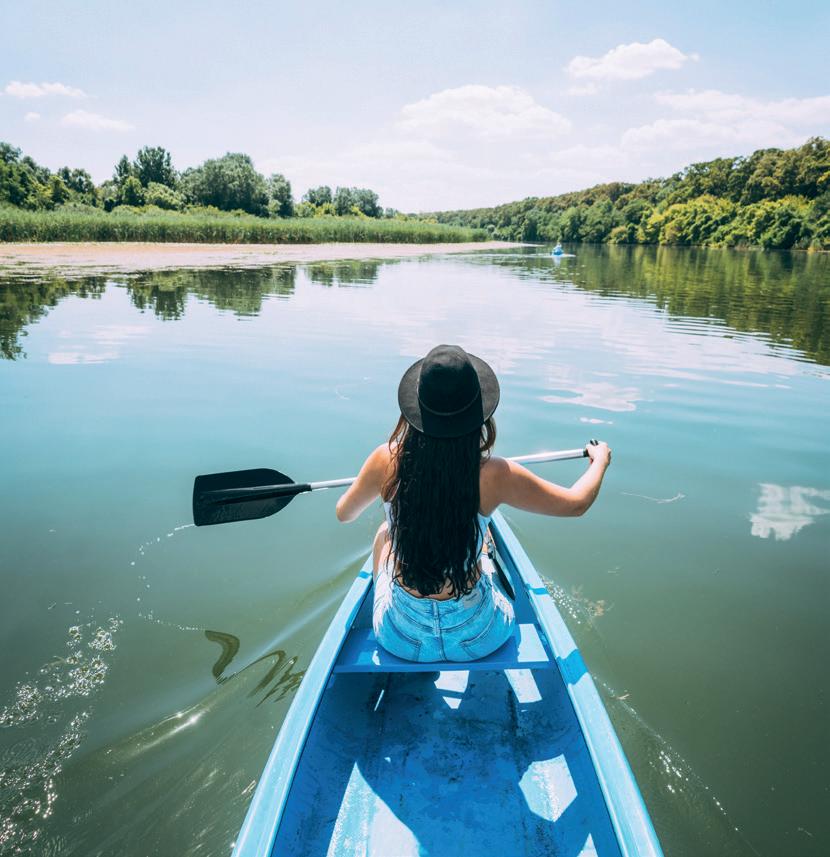
the magazine for the danube countries Edition Economy, Start-ups, Cooperation in the Danube Region 1 | 2023




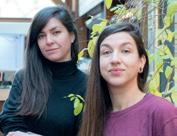
danube connects 01 I 23 2 Content
ARE HERE TO STAY AND WANT TO BE PIONEERS OF GREEN SOLUTIONS." Female founders in Bulgaria..................4 FIT FOR THE FUTURE The information platform Green Deal....7 MORE RESILIENCE IN THE DANUBE REGION: Danube Alliance Network......................8 THE DANUBE IGNORES BORDERS - KEEP IT UP! 20 Years Danube Office Ulm/Neu-Ulm...10 ON A FEMALE MISSION Job search support for Ukrainian women in Germany..............12 THE DANUBE REGION AT THE TURN OF TIMES New forums of cooperation.................13 FRIENDS OF THE DANUBE Start-up founder Srdjan Stankovic in Belgrade with his vision..................14 AN EXAMPLE OF SUSTAINABLE ECONOMIC DEVELOPMENT German business clubs in Romania.............................................16 THE IT COMPANY NETEX Success Story from the Banat..............17 PIONEERS AND ROLE MODELS Liese Prokop Women's Award ceremony in Lower Austria.................18 70 YEARS OF IDM Research on the Danube Region..........19 IT SUPPORT PROGRAMME UKRAINE New opportunities for Ukrainian IT enthusiasts......................20 EMERGENCY FUND FOR CONSEQUENCES OF THE WAR OF AGGRESSION IN UKRAINE Support programme of the Baden-Württemberg Foundation..... 21 EU YOUTH POPRI 2023 Innovation in Wonderland.....................22 BORDERLAND Photographs and interviews with refugees from Ukraine in Moldova by Frank Gaudlitz...................................24 IMPRINT 21 DANUBE OFFICE ULM/NEU-ULM 14 12 13 UKRAINE AID SRART-UP 4 EU-PROJECT TRANSDANUBE PEARLS 10
"WE
THE DANUBE REGION AT THE TURN OF TIMES
ew times, new challenges.
When I travelled to Serbia and Hungary last summer, I saw maize fields whose plants had only grown to half of their normal height and were completely dried out. A sad, even shocking picture!
Climate change and its effects have long since arrived in the Danube Region. Politicians sometimes lack the vision but also the will to change.
But they do exist, young start-ups that develop ideas and projects for a better future with innovative spirit! A new generation that wants to stay in their own country or even returns to change the awareness for sustainability and the environment.
Be it sustainable tourism, sustainable management, new forms of energy production - there are many tasks to be tackled that also bring new opportunities.
We present some of these examples of innovation in the current issue. New forums for economic cooperation are emerging. There is also funding for refugees from Ukraine, helping young women to build a new future. And we show a photo reportage from the neighbouring country Moldova, which has deeply affected us - people who have lost hopes for a future.
Let us work towards a peaceful future, so that maize can once again grow and flourish. We need to increasingly encourage and support the promising ideas of creative start-ups and young people.
danube connects is on Facebook, twitter and Instagram!


We offer information and images from the international press on politics, tourism and culture in the Danube region. Furthermore, we keep you on track about the Danube Strategy and the various events alongside the Danube. Come and take a look!
Sabine Geller, editor-in-chief & founder, danube connects
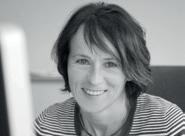
You want to share interesting information on the Danube region?


Just send a link to info@danubeconnects.eu.
the magazine for the danube countries

Tel. +49 (0)731 153 75 05
Fax +49 (0)731 153 75 06
info @danube-connects.eu
www.danube-connects.eu
www.facebook.com/danube.connects
twitter.com/DanubeConnects
www.instagram.com/danube_connects
Editorial
Dear readers,
N
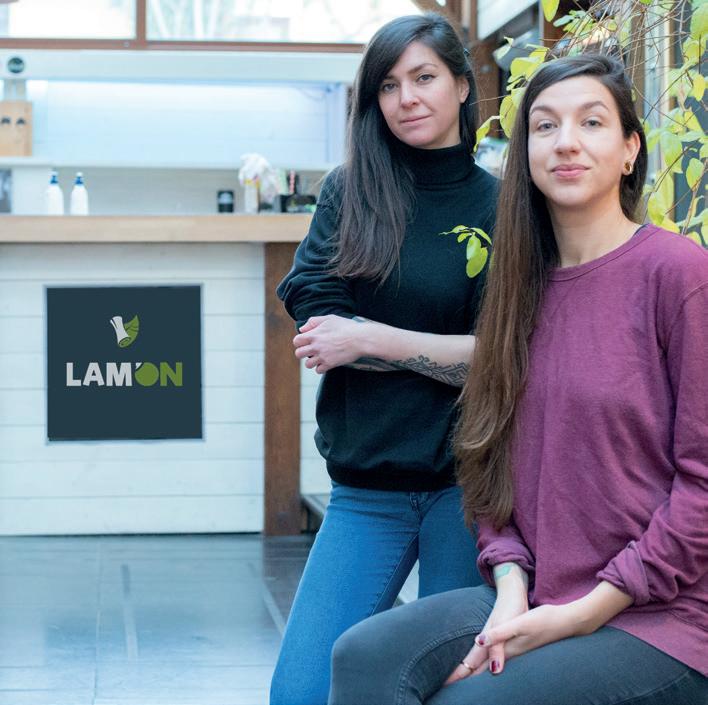
4
Angela Ivanova and Gergana Stancheva:
“
We are here to stay and want to be pioneers of green solutions.“
FEMALE FOUNDERS IN BULGARIA
May 2018. I hurry to the meeting point, car after car rushes beside me along the large boulevard in the centre of Sofia. Gergana Stancheva and Angela Ivanova are waiting for me in the park. They don't have an officewe want to do the first interview on a bench. After a few minutes, it starts to drizzle slightly – we quickly take one or two photos, pack the equipment and find a cosy café where we can finish our conversation.
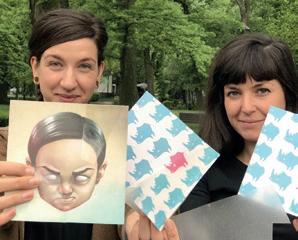
Five years later, we wave to each other from our living rooms via Zoom - the founders still don't have an office, they say with a laugh, "that's not on our todo list at all, rather the focus is on developing our product," says Angela Ivanova. Back then - in Sofia - they told me about their idea for an environmentally friendly and compostable lamination for paper. Today they tell me about the first production machine, which is to be delivered in the next few days. The road so far has been long and arduous, but in April the two women and their company Lam'on finally want to start production.
Focus on the environment
Both founders have a professional background in the printing industry, and both were not happy with the conventional production methods, which use numerous harmful chemicals and polyethylene made from petroleum. Both of them knew - we have to do something to protect people and nature.
Together with scientist Philip Ublekov, they developed a recipe for an environmentally friendly and compostable lamination for paper based on a biopolymer. "This biopolymer is based on corn starch. However, it is important for us to emphasise that we are not depleting maize - an essential feed and food - but only using 0.05% of the plant to produce the lamination," says Gergana Stancheva.
They get the resources mainly from the USA. "Before the major Russian attack, there were also concrete approaches to
biopolymer production in Ukraine, but you can guess why this is not possible now."
Little support from the own state
The process of developing the unique recipe was not easy - several trials were necessary and countless prototypes were made. They have not received support from the state: "We don’t have the conditions here to test pre-industrial prototypes. There are no institutes, scientific laboratories or university centres like in Western European countries where we as young entrepreneurs could have tried out the ideas in a test environment. We had to turn to industry and find a factory that could provide us with space and equipment to do our tests. It was not easy to find these facilities to develop our product. After some time, we were able to buy a small machine and set it up in the electronics factory in Sofia, where we could run our experiments," says Angela Ivanova.
I want to know if they haven't thought about moving to another country. They both laugh heartily: "Maybe we're still here because we're just very stubborn," says Angela Ivanova. And yet they admit to having talked about relocation from time to time. Quite a few investors think twice before investing their money in production in Bulgaria. Although the country is developing into a reliable location, the old image has still not been shed, says Angela Ivanova.
Change is coming - from below
"Actually, we believe that things will get better here. The young people have ideas, want to make a difference. Chan-
ge is coming - slowly but surely. Not from above, not from politics, which should actually facilitate the framework conditions for such green ideas, but from below, from the young generation that wants to live in a more environmentally friendly way," both founders are sure.
Not only in politics, but also in the media, environmental issues only take place on the sidelines. Environmental issues are rarely discussed on television. "But when waste is burned in power plants and people have to wipe a layer of soot off their car windows first thing in the morning, then they understand what reality they are living in," says Angela Ivanova.
5 Start-up
Angela Ivanova und Gergana Stancheva
According to her, there already is an awareness of environmental issues, but many people in Bulgaria have other everyday concerns on their minds. "Living in an environmentally conscious way, separating waste, eating less meat - these things have to be communicated to the people here more carefully - and not in a patronising way, otherwise you will achieve exactly the opposite, and then everyone will say, leave me alone with this stuff. But the green ideas and solutions - also those in everyday life - will come, and they will come from the younger generation, which is much more sensitive to them," thinks Angela Ivanova.
That's why they also see their future in Bulgaria: "We see potential here and want to be part of the development of this country. We want to be proof that green technologies and green products can be developed and produced here. We want to be a role model for others," says Gergana
Stancheva.
Team Lam'on is the first to develop and successfully test this new environmentally friendly lamination technology.

demic, everyone is ordering online, mountains of boxes are piling up in every household - and no end in sight. That's why we've been looking for solutions to develop degradable packaging. One of our products - pack'on oceancan dissolve even at a low temperature of 10 degrees - in ocean water. The other products are degradable in the soil or can be recycled."
They already have a patent for the formula in Bulgaria and have filed an application to the European Patent Office, which they plan to defend next year.
Investors are also convinced by the idea - they won several grants, are part of the funding programmes of the European Institute of Innovation and Technology (EIT), as well as the European Innovation Council (EIC). Thanks to this financial support, they have already found a production site in Sofia - 1500 square metres with plenty of space for a laboratory to develop further innovative products.
The two founders are optimistic that they will soon be able to offer their products not only in Bulgaria, but also on

our environmentally friendly products, but the manufacturers who pollute the environment with their plastic products don't have to pay anything. When will there be a certificate for all those who are responsible for polluting the environment? Who pays the price for nature?"
to make a difference.“
They are currently also developing a packaging material that can dissolve in cool water. "Since the Corona pan-
the European market and beyond. However, they have one wish: "We have to spend a lot of money to certify
danube connects 01 I 23 6
Start-up
Rayna Breuer, Bonn
“Actually, we believe that things will get better here. The young people have ideas, want
Das Team von Lamon
Making SMEs
"Fit for the future”
Climate change has long since arrived in Europe and can also be felt in the Danube region - whether in private households, public institutions or companies. The EU wants to take countermeasures and has presented the Green Deal, a master plan to make Europe the first climate-neutral continent by 2050.

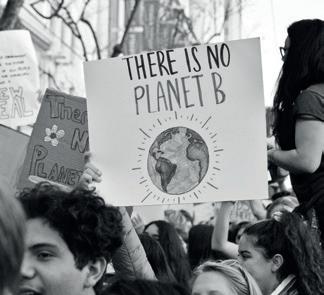
The Baden-Württemberg Ministry of Economics, Labour and Tourism, in turn, has joined forces with partners to launch a campaign to help small and medium-sized enterprises (SMEs) implement the Green Deal.
Since all countries and regions in Europe are affected by global warming and its consequences, they all have an interest in finding a common solution. There is a broad political and social consensus among European countries to accelerate the path toward greenhouse gas neutrality and to actively advocate climate protection. The resulting European Green Deal envisages, as a central component of EU climate policy, reducing net emissions of greenhouse gases in the EU to zero by 2050. Furthermore, reconciling successful climate protection and a sustainable economy, because making this transformation economically, ecologically and socially compatible is a challenge.
Across the Danube Region, companies are now faced with the task of achieving greenhouse gas neutrality while remaining competitive. SMEs in particular, which account for a large part of the economic power in the Danube Region, have an important role to play: due to their top performance in innovation, they can enable and drive the implementation of the Green Deal. At the same time, however, they often have
little time and resources for strategic reorientation.
Digital pilot through the Green Deal

This is precisely where a new initiative in Baden-Württemberg comes in: as part of a collaboration between the Ministry of Economics, Labour and Tourism, the Enterprise Europe Network - the EU Commission's network for supporting businesses and innovation - and the innovation consultancy Steinbeis Europa Zentrum, SMEs are to be supported on their way to climate neutrality as part of the "Fit for the Future" information campaign. The website greendeal4kmu-bw.de, which acts as a "pilot for SMEs through the European Green Deal", serves as a central point of contact.
Here, SMEs receive an overview of the EU's plans and measures in connection with the Green Deal as well as information on concrete starting points for change processes in their own businesses. In addition, the website breaks down Green Deal measures for practical use
and provides information on advisory and funding opportunities. The offer is supplemented by events for SMEs on various aspects of the Green Deal.
The transformation to more sustainability affects all companies, regardless of size, sector or region."
Dr. Nicole Hoffmeister-Kraut, Minister of Economics, Labour and Tourism, explained the background of the initiative: "The transformation to more sustainability affects all companies, regardless of size, sector or region. With our campaign, we want to show our SMEs concrete options for action and thus support them in implementing the Green Deal in their own companies."
Support offers like this are intended to help make the Danube Region fit for the future. If you know of similar practical examples of support for companies in implementing the Green Deal from other regions in the Danube Region, Ms Carmen Hawkins (carmen.hawkins@ wm.bwl.de), coordinator of Priority Area 8 of the EU Strategy for the Danube Region, would be pleased to hear from you.
danube connects 01 I 23 7
More
resilience
in the Danube Region:
Becoming relislient through new approaches to value chain development
The new understanding of value chain development
What began with the COVID 19 pandemic was fuelled once again by the war in Ukraine - supply chains do not function reliably, trade routes at the beginning of the value chain are interrupted, companies can no longer produce and at the same time large markets are lost due to economic sanctions. Further disruptions and crises are also to be expected due to climate change. In order to be able to cope with these problems, competitive companies, diversified supply chains, digital tools and thus overall more resilience are needed - also in the region around the Danube.
Small and medium-sized enterprises (SMEs) in the Danube Region are particularly dependent on forming new value chains in order to remain competitive in the future. The recent crises have revealed clear weaknesses. New approaches and tools are needed to make value chains more efficient, resilient and sustainable. However, companies across the Danube Region lack knowledge on how to readjust their value chain management and find the right partners for sustainable value chains. Both suppliers (mostly SMEs) and buyers need targeted support to ensure crisis-proof value chains. This results not only in new requirements for value chains, but also in an urgent need for additional support for the development of these very chains.
In order to reduce the impact of disruptions of any kind as effectively as possible in times of crisis, a robust and adaptable value chain network is necessary. To enable such a network for different use cases, the Danube Alliance was launched at the beginning of 2021 as a flagship project of Priority Area 8 of the EU Strategy for the Danube Region. The overarching goal of the project, which will run until the end of 2022, was to promote the resilience of existing and new transnational supply chains in the Danube Region, namely to support small and medium-sized enterprises in embedding themselves in new value chains and to contribute to making the Danube Region more competitive. Ultimately, the project was able to make an important contribution to reducing dependencies on non-European suppliers and stabilising fragile elements of a value chain.
The project also became a success through its first use case: the Danube Alliance selected Miscanthus (also known as elephant grass) for the analysis and modelling of a robust value chain. Originally from Asia, the species Miscanthus x gigantheus has multiple uses that could make the plant an important resource for the bioeconomy in Europe. In addition to its use as a fuel, miscanthus can also be used to build a biogenic circular economy. Following this example, the project was able to achieve a multi-method approach comprising three main steps: 1. identify & understand, 2. analyse & simulate, and
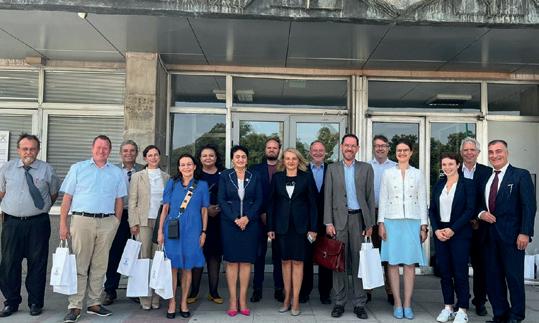
danube connects 01 I 23 8
Economy
Danube Alliance & Danube Alliance Network
Warm welcome for the Baden-Württemberg delegation at the town hall in Widin
The semiconductor crisis at the beginning of 2020 and its impact on the automotive industry have made it clear: global supply and value chains are more crisis-prone th.an expected.
3. act & implement. For the latter, the Danube Alliance consortium went on a trip to Sofia and Vidin in Bulgaria in September 2022 to meet with regional stakeholders for the Miscanthus pilot project. The focus of this meeting was on regional needs, joint research of appropriate areas for Miscanthus use and a possible implementation strategy. For this purpose, the delegation held numerous discussions with various local authorities. "I was pleasantly surprised by the great interest in Vidin in our proposals to use biomass for renewable energy production and the willingness to cooperate," remarks Carmen Hawkins, Priority Area 8 Coordinator for the Danube Region. Now it is important to turn words into deeds and develop something concrete.
Until its project completion, the Danube Alliance focused on understanding, analysing and promoting resilience in selected (bioeconomic) value chains to support the inclusion of SMEs in more sustainable and resilient value chains.
The Danube Alliance Networkthe next project phase
The Danube Alliance was also able to establish itself in the first project phase as a platform that supports the formation of tailor-made partnerships and consortia for further (cross-regional) projects related to the development of resilient value chains and identifies suitable funding opportunities for project initiation. The approaches of the Danube Alliance and the Value Chain Generator tool introduced in this phase - a software to identify the most suitable trade links - are still new and need to be further developed. Likewise, the development of a living network with selected partners from the Danube region is still in its infancy. This is precisely where the next phase of the project, which is scheduled to run until 2027, comes into play: the development of the Danube Alliance Network. This network is intended to help connect more partners from the Danube region and jointly develop and strengthen sustainable value chains with a focus on the circular bioeconomy.
Jennifer Ohnmacht, VDI/VDE Innovation + Technik GmbH
Energy from plants? It depends!

Danube Alliance Projektkonsortium: VDI-VDE-IT GmbH, BioPro, Hochschule Reutlingen, Steinbeis Europa Zentrum
Should maize be on the table or in the tank, providing food or energy? Baden-Württemberg rejects the large-scale cultivation of maize for energy production for ecological reasons.
In Bulgaria, what is currently still burned in the fields goes into the tank: Residual materials such as wheat stalks, corn stalks or leaves. The miscanthus project in the Widin district goes one step further. There, the cultivation of food crops on 25,000 hectares of land is not worthwhile due to the quality of the soil. Instead, miscanthus is to be cultivated on this so-called marginal land for energy production. In the long term, the plant also improves soil quality.

danube connects 01 I 23 9 Economy
The already legendary Danube Festival
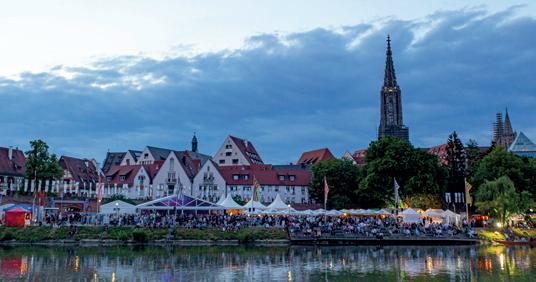
The Danube ignores borders - keep it up!

It was just a generation ago that the Danube, Europe's second longest river, was not a blue ribbon linking country after country like a string of pearls. By the way: more countries than any other river on this earth! 34 years ago, the Danube was part of the Iron Curtain that separated East and West.
You can hardly imagine this when you consider what an important connection this river was for people all those centuries before. For trade, for brave people who wanted to build a new life elsewhere, for the first river cruise tourists, for the exchange of culture and plain old everyday life: grain was ground with mills driven by Danube water, the now endangered sturgeon, the "King of the Danube", was fished, as were many other fish. Important cities such as Budapest, Vienna and Belgrade were built. And so, ignoring the border, the Danube just kept on flowing: from Donaueschingen via Ulm to the Black Sea.
20 years of the Danube Office Ulm/Neu-Ulm
20 years ago, the cities of Ulm and Neu-Ulm founded the Danube Office, as a kind of profession of faith. It was meant to reaffirm faith in Europe and European integration. It was supposed to counteract nationalist currents so that the history of division between the states along the river would not be repeated.
It did not remain a mere declaration of belief. The Danube Office filled it with life over the past two decades. For democracy and peace, it was felt, had to be lived from below. By the people who live in the Danube countries. In Ulm, the event format Donausalon (Danube Salon) was created, which since then regularly invites people to lectures, concerts and discussions. Numerous larger projects also developed.
A festival where every two years the motto is: a unique festival! Visitors are served a concentrate of all Danube countries: from Germany, Austria, Slovakia, Croatia, Hungary, Serbia, Romania, Bulgaria, the Republic of Moldova and Ukraine. There is typical wine from Austria and the Balkans, Ćevapi from Serbia, Croatian bean stew, colourful and flowery Ukrainian handicrafts, traditionally embroidered Romanian peasant blouses, and along the mile with stalls along the banks of the Danube in Ulm and Neu-Ulm, you can above all hear the Danube : music from the countries, people speaking the local languages and - at a late hour - happi ly lying in each other's arms, belting out folk songs from the bottom of their hearts. Like last year at the Croatian stand. The festival attracted 405,000 vi sitors last year.
Commitment to Europe
The Danube Office (DBU) is also always involved in EU projects. Currently, the DBU and its project partners are pro moting the European Energy Award and its dissemination in the Danube Region. The European Energy Award supports municipalities in implementing activities in the field of climate protection and sustainability. In addition, certifications can be obtained that promote public awareness.
The Danube Office is also committed to Ukraine. Since the beginning of the war, weekly vigils for Ukrainian refugees have been held on the market square in Ulm out of solidarity.
danube connects 01 I 23 10
Office
The International Danube Festival in Ulm/Neu Ulm takes place every two years
Danube
Discovering the Danube
How nice it is to discover the Danube countries - instead of always Italy or going off by plane to Spain or Thailand. This is what the tourism projects want to show. The focus is on gentle and sustainable tourism. Travelling by bike, on foot, by train or sometimes by boat. No fast food-like tourism, but conscious and intensive travel without destroying culture and nature. For this purpose, more than 90 "Danube Guides" were trained as tourist guides.
They are now just such nature-culture guides and convey the natural and cultural heritage of the Danube region. To adults, children, pupils, the local population and people with disabilities.
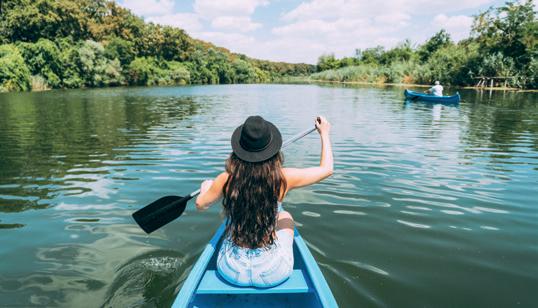
itinerary. Photographer Dominic Lars Breitbarth tried out part of the "Nature Love" route with his girlfriend. He talks about the tour through the nature of Serbia, Croatia and Romania. He was par-
trade. The Danube is one of the oldest trade routes in Europe. In Ulm, the city tour "Ulm money rules the world" was developed. The guided tour can be booked at the Ulm/Neu-Ulm Tourist Office
danube Travel Stories was completed. Six travel routes through the Danube countries were created, each with a special focus: "Contrasting Europe", "Nature Love", "In the Footsteps of the Romans", "Art and Culture", "Danube Trade Route" and "Danube for the soul".
On the website www.danube-pearls.eu, various influencers have presented the six travel routes, peppered with tips on sights, natural beauty, favourite places and the best way to get from A to B. The videos are also available in German. There is a short video as an appetiser, an overview of the cities and countries on the route and a downloadable
ticularly fascinated by the area around the Iron Gate because the Danube breaks imposingly through the mountains there. "A real gorge!" It was interesting that the water level at this point was only so high because the Danube was dammed.
Dominic Breitbarth would recommend Kopački rit in Croatia - a flooded area and a nature park on the Danube. "We went there with a ranger at sunrise. He showed us some places and where the water normally stands and drains away again." There, the two also saw many animals: Cormorants, deer, pigs, eagles, black storks and kingfishers. As a photographer, Breitbarth was particularly fascinated by the bee-eaters - an insanely colourful bird. "There are only a few places in Germany where you can see bee-eaters."
The "Danube Trade Route" trail looks at the Danube from the perspective of
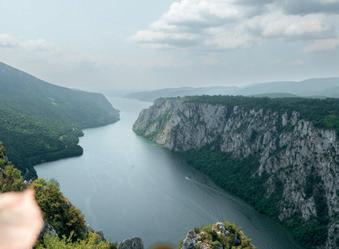

or via the Future History app starting this summer.
By the way: The Ulm Danube Office is chirpy with its 20 years. It is already planning a series of exciting events for this year. For example, readings, concerts with panel discussions - for example together with the completely renovated Danube Swabian Central Museum and other Danube actors from Ulm and Neu-Ulm. But events in the beer garden Roxy are also on the programme.
www.danube-pearls.eu/danube-travel-stories
www.danube-pearls.eu
www.donaubuero.de
Tours with a guide: https://danube-guides.net
www.tourismus.ulm.de
danube connects 01 I 23 11
INFO
Isabella Hafner, Ulm
Paddling near Sombor on the "Nature Love Route" along the Danube
Office
The 'Iron Gate' in Serbia
Danube
On a female mission
Since 2020, the association ABLE e.V., founded on the initiative of several Ukrainian-born women, has been taking care of women from Ukraine. A valuable community has developed between refugees and helpers. We spoke with Iryna Gumenschuk, one of the seven founders.
explains Iryna Gumenchuk, who was born in Ukraine and is a co-founder of ABLE e.V.
us to continue supporting the women and young people from Ukraine directly," explains Gumenchuk.

Act-Build-Lead-Engage - The association with this hopeful name ABLE e.V. promises what its name means. Each letter stands for the voluntary engagement of women from the Danube countries for women from Ukraine.
And helping is so simple, as this project shows. It creates support services for Ukrainian women refugees and volunteers from the Danube region who are active in Ukraine and in the border regions, coping with the consequences of the war. In addition to a rapidly growing and active information platform with by now 12,000 Instagram followers, ABLE organises personal group meetings, which also form the core of this important association. Empowerment talks and helpful networking take place during brunches, nature excursions and seminars that they organise. The focus is on helping the women who have fled back into normal everyday life: "We give the affected women tips and tricks about finding a job and tell them about life in Germany. And thanks to funding from the Baden-Württemberg Foundation, we can also set up local MeetUps,"
On her own initiative, she and six other Ukrainian-born women in Germany founded this meeting place during the pandemic. The decision was spot on, because it has been enthusiastically received. Motivation for more projects of this type has been kindled: "How active and full of energy these women are! Already after the first job application training, the women contacted us and told us that they had found a job. Despite their traumatising experiences, they remain positive and try to move on with their lives. I see great potential," Gumenchuk continues.
The whole thing is financed by the Baden-Württemberg Foundation, among others. Privately, anyone who wants to

Because it is not only the Ukrainian women who learn from their colleagues from the Danube region: "Personally, I learn how strong, courageous and helpful they are. They don't give up. That gives me motivation to keep working!" A giving and receiving towards peace, tolerance and humanity.
 Mirella Sidro, Sarajevo
Mirella Sidro, Sarajevo
can help: "We have developed different types of membership and are looking forward to welcoming new members. This way we can guarantee the work of the association. The donations enable

danube connects 01 I 23 12 Ukraine-aid
Act Build Lead Engage
Sonderveröffentlichung der
First MeetUp in Berlin
"The Danube Region at the Turn of Times"
Like no other crisis before, war threatens our coexistence in the European Union. The term "turning point" aptly describes the distinctive phase in which we find ourselves.
It is therefore important for the EU to take a clear and united stance. The European gaze is strongly directed towards the East. Cooperation is becoming even more important.
Since 2011, the Baden-Württemberg Ministry of Economics, Labour and Tourism has been playing a leading role in the EU Strategy for the Danube Region (EUSDR) in the area of SME policy. New formats of cooperation were sought and found in the new event series "The Danube Region at the Turn of Times". The goal is to find solutions in the community of Danube countries, to strengthen each other and to actively shape the transformation. Support for Ukraine is the focus of everything. In addition, topics such as the Green Deal, energy security, resilient value chains and the associated value-based business community, or the greater use of economic potential in the neighbourhood (so-called nearshoring) also play a major role - all topics that will shape the future of coming generations.
"After the pandemic and in the current difficult time of crisis, it is even more important that the partners and friends from the Danube region meet and coordinate their basic attitude and concrete
cooperation in politics, economy and society," said Dr Patrick Rapp, State Secretary in the Ministry of Economy, Labour and Tourism.
The event "The Danube Region at the Turn of Times - Actively Shaping the Transformation. Solution approaches for politics and business", which will take place on 10 July 2023 in Stuttgart, is jointly organised by the Ministry of State and the Ministry of Economics, Labour and Tourism. State Secretary Florian Hassler and State Secretary Dr Patrick Rapp will be on hand to provide impetus and exchange ideas with guests from the Danube region.
The first two events of the series in summer 2022 in Ulm were already highlights, organised in connection with the International Danube Festival and the Eastern Europe Forum in autumn 2022 at Global Connect in Stuttgart. "At both events, it became visible how important and profitable the great foundation of transnational coopera-
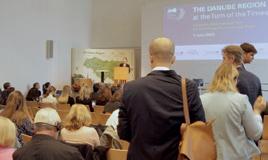

tion in the Danube region is. We use the solid foundation of the Danube Region Strategy and expand it with important building blocks. Therefore, we are burning to host the events and hope for a great interest," says Carmen Hawkins, EUSDR Priority Area 8 Coordinator.
Note on the event on 10 July 2023
Location: Stuttgart, Haus der Wirtschaft
Registration: pa8_eusdr@wm.bwl.de

Video documentation
Event 1 July 2022 in Ulm
https://competitiveness.danube-region.eu/ gallery_category/videos
danube connects 01 I 23 13
INFO
Rethinking Europe - New forums for cooperation
FRIENDS OF THE DANUBE
Srdjan Stankovic
matian coast in Croatia. After high school in Salz burg, he studied economics at Richmond College in London, then took part in an exchange programme at the University of Sydney in Australia, specialising in international marketing. Since 2000, Srdjan has been living in Belgrade, where he worked in the textile and brewery industries. Now he wants to share his vision with us:
dc: Srdjan, you founded the organisation “Supernatural” in Belgrade. What was your goal and what have you already achieved?
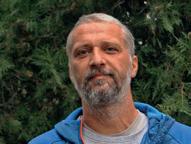
Srdjan S: In 2007 we started a festival that celebrated Mother Earth Day, 22 April. The idea was to create a fun atmosphere for young people to learn about the environment. This concept called "edutainment" proved to be very successful. The young people were enthusiastic and the festival achieved great media coverage.
In 2011, we started a new project: "Revitalisation of the eco-system of Ada Huja Island" in the Danube, four kilometres away from the centre of Belgrade.
What do the Supernatural Festival and the Supernatural Park offer?

Ada Huja was an island that had been used as a rubbish dump since 1960. Over the years, the island's ecosystem was severely damaged. The twelvehectare tip of the island was used as a construction waste dump. Through a
complex revitalisation project, we were able to transform the landfill into a forest.
In the course of 2012, the Supernatural Park was created with a "green classroom", greenhouse, bird watching tower, children's playground, volleyball court, irrigation system as well as with solar panels and a wind generator; a small beer bar and five gardens are also part of it.
In 2014, the Supernatural Park was chosen as one of the 25 best projects in Europe and was awarded a prize by the EU Parliament. Today the park offers lush biodiversity with 1,000 new trees, five gardens, 37 plant species, 91 species of birds, bees and butterflies; it is full of life. The new forest is the only forest on the right bank of the Danube in Belgrade.
How were you able to realise such a difficult project and who supported you?
experts from different fields and raise money from the business community. We received financial aid from compa nies, but also from the city of Belgrade and the embassies of the USA, Canada, Norway, Germany and the Nether lands.

You work a lot with young people and convey a better understanding of nature. How does that go down with young people?
Young people love nature and it is important to involve them in nature-based activities. We use the edutainment formula and it works. Young people want to learn, but they also want to have fun. When you combine both, you have understood the language of youth.
Do the participants come from all the Danube countries? Who are your partners?
In 2013, I met Stefan Barth from Agapedia Foundation at a conference on the Danube in Russia and Bulgaria. Stefan shared the same passion for the Danube as I do, we understood each other right away. For the past seven years we have worked together on a project, the "Danube youth network" (DYN), a platform for youth empowerment along the Danube.
You work with the groups along the Danube. Which places do you visit and what activities are offered?
danube connects 01 I 23 14
Start-up
“FRIENDS OF THE DANUBE” wants to connect young and young-atheart people along the Danube.
A T-shirt from the Friends of the Danube collection
Through the DYN platform, we have visited many places along the river, from the Black Forest to the Black Sea. Supernatural primarily organises youth camps where people can learn about the Danube's biodiversity and be active on the river at the same time. We want to promote an active lifestyle, for example with hiking, cycling, kayaking, bird
We were supported by the Baden-Württ"Friends of the Danube" (FOD) started with a series of youth camps along the Danube. These were intended as hands-

concrete, local youth work. We are continuously expanding our network across different countries.
So FOD is a platform that works with youth on many levels. Simply put: We as the young generation want to leave the river in a better state for the next generation than we found it. That is what the Friends of the Danube are all about.
Now a fashion label is to be created. The logo has already been developed. How far along are you with the implementation? Have you already found partners for production and are the ma-
When can we buy the first T-shirts or jackets with “Friends of the Danube”?


On 22 March 2023. Online at www. friends ofthedanube.com.

Where do you plan to offer it?
At the beginning it will be online, then we plan to offer it throughout the whole Danube Region. We are looking for potential investors, but also companies in the Danube Region that we can work with.
on educational camps where young peo ple learn about the Danube's biodiversity through "edutainment".
To make this project sustainable, we launched the fashion brand "Friends of the Danube".The aim is to use the clothing brand as a communication tool around the Danube's biodiversity and as a model for sustainability.
How is “Friends of the Danube” linked to the EU Danube Strategy and what is your understanding of the EU Youth Strategy?
Friends of the Danube (FOD) is linked to the EUSDR institutions and projects at all levels in terms of content and strategy. FOD supports the EUSDR Youth Strategy and links the content-related goals of the EUSDR priority areas with
terials produced in an environmentally friendly way?
The first shop will be online at www. friendsofthedanube.com. The production facility is located at a local partner in Serbia who has been active in textile production for many years and produces textile items for customers locally and in the EU.
The textile industry has a massive impact on the environment worldwide, especially on rivers. We want to bring about change and create a brand that will have a positive impact on the Danube.I have to say that we are inspired by Yvon Chouinard and his incredible Patagonia story, so we have a place to look up to.
connects 01 I 23 15
Friends of the Danube Camp 2021 in Moldova
What message do you want to bring to the Danube Region with Friends of the Danube?
“Friends of the Danube” is a brand with a goal. Our slogan is “Thread that connects us all”.
What does your family say about your ideas and visions? Do they support you?
My family supports me and this support is very important.
An example of sustainable economic development
Eight German business clubs are active in Romania
It was in 1995, when Dr. Anna Prinz, working as an economic officer at the German Embassy in Bucharest, met - as she did every month - with a small group of representatives or executives of German companies at her home. They would exchange ideas or experiences on how to concretely help German investors. It was then that the idea of "formalizing the informal exchange of experience meetings and establishing a club of entrepreneurs/executives" first came up. After all, a German Chamber of Foreign Trade, which could have taken over such advisory or service functions, was not yet in sight. All executives present, including Peter Simon (ABB), Werner Stein (HR)???, Wolfgang Limbert (GTZ/GIZ), Christian Becker (Becker Brewery) were spontaneously enthusiastic about this idea. This is how the German Business Club Bucharest came into being.
Peter Simon, then the head of ABB Romania and Bulgaria, was elected as the first president of the German Business Club. A success story took its beginning. Today, there are eight
business clubs in Romania, whose members include German-speaking entrepreneurs from Germany, Austria, Switzerland and Romania.
In 1998, the German Business Club Transylvania was founded in Hermannstadt/Sibiu. It is one of the largest German business clubs in Romania with about 200 members, followed by the German-speaking business club "Banat" in Timisoara with about 180 members, founded in 2002. With the exception of Bucharest, most German-speaking investors are located in Transylvania. The four German business clubs in Hermannstadt, Kronstadt/Brasov, Klausenburg/Cluj-Napoca and Neumarkt/Targu Mures are responsible for them. Western Romania is covered by the business clubs in Timisoara and Arad. In the Moldova region, the youngest club is active in Bacau, and in the north of Romania - the German-Romanian Business Club Sathmar/Satu Mare.
The approximately 800 member companies of the eight German-speaking business clubs, together with the

Good luck for the future and your projects!
I appreciate your support and thank you very much!
Interview by Sabine Geller
Shop: www.friendsofthedanube.com

See more: www.instagram.com/ friendsofthedanube
roughly 500 member companies of the German-Romanian Chamber of Industry and Commerce (AHK) in Bucharest, which has been in existence since 2002, are Romania's most important investment and trading partner by a wide margin compared to other nations. The 500 member companies of the AHK alone employ around 300,000 people in Romania. With a bilateral trade volume of 35 billion euros in 2021 and an FDI of German companies in 2020 of 13.79 billion euros, Germany is Romania's most important economic partner, supported by the German-speaking companies, most of which have organized themselves in the business clubs. In the last few years, some German-speaking business clubs have dedicated themselves above all to the issue of training and further education of workers according to the "German dual system", thus making a significant contribution to the training of highly qualified skilled workers in Romania.
Wolfgang Limbert
danube connects 01 I 23 16 Economy
A success story from Banat
The Netex Group employs 700 people in nine countries
DANUBE WOMEN STORIES * DANUBE
It has been 23 years since Andreea Kremm and her partner Claudiu Patt founded Netex as a pure Internet provider in Resita, Romania, in the Banat Mountains. This was the beginning of the success story of a company that today employs around 700 people at 24 locations in nine countries.
This was followed in 2001 by the establishment of Netex Production and Netex GbR in Sonderhausen, Germany, as an Internet content provider. A short time later, in November 2001, the headquarters of the company was moved to Timisoara. The company activity was expanded year by year - Netex thus became an Internet Content Provider with the main tasks of web programming and office services. At the same time, the first customer service center of the company was opened. The company grew rapidly, achieving new successes almost every year: Customer support centers were opened in several Romanian cities, services were offered in more and more languages. Ten years later, the company also had branches in Serbia, Ukraine and Moldova. The company's success was recognized with awards from the Chambers of Commerce from the different countries where Netex employs people.
Netex has also been a member of the German-speaking Business Club (DWC) "Banat" since 2013.
Entrepreneur Andreea Kremm is currently also involved as Vice Chairwoman of the DWC Banat. Membership in the club brings the company a lot. "Firstly, networking and always upto-date information on the economic situation, and secondly, customers," she says. "Before Netex was a member of the DWC, I had no customers from Romania on principle, because they are not particularly fond of paying in full and on time. The companies that are members of the DWC have turned out to be exceptions to that rule. All my Romanian customers come from Germanspeaking countries and are members of a business club," says the businesswoman.
The success story of Netex is to be continued on another continent in the future. "Future plans include expansion to the USA, to Philadelphia, where we are currently in the start-up phase," reveals entrepreneur Andreea Kremm.
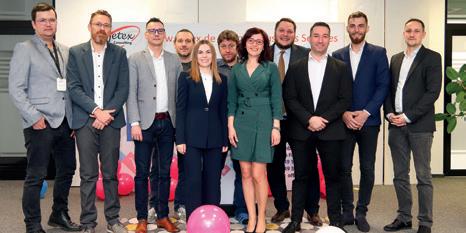
Raluca Nelepcu, Temeswar
They are fascinating and wise women from the past and present who play an important role in public life and societies in the Danube countries. They come from Ulm, Regensburg, Linz, Vienna, Budapest, Vukovar, Novi Sad and Timisoara. The aim of the book: to make visible the achievements and successes of these women from the past and present.
DANUBE WOMEN STORIES VOL. 2. Sabine Geller/Christiana Weidel/ Belinda Schmalekow (Hg.): danube books Verlag ISBN 978-3-946046-22-6.
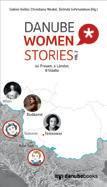
Readers can participate interactively: Here everyone can suggest a woman to be mentioned in the sequel. What is your suggestion?
HAVE A LOOK HERE!
The DIGITAL EXHIBITION of the Danube Women can be found here.

danube connects 01 I 23 17
Economy/Women
Women as pioneers and role models today
LIESE PROKOP WOMEN'S AWARD CEREMONY

You could almost hear the hearts of the visitors beating loudly at the ceremonial awarding of the Liese Prokop Women's Prize at the Congress Center Baden near Vienna. Liese Prokop - Lower Austria's top track and field athlete, high-ranking politician and promoter of women: in her honour, women have been honoured every two years since 2007 for their extraordinary achievements in business, science, culture and social affairs.
From the 101 women nominated, a highly qualified jury had to select twelve award winners...: The criteria were extraordinary stamina in economic crises, inventiveness coupled with a commitment to sustainability, and a willingness to work consistently and persistently for a fairer world.

Pioneers and "nerds"
in front of the curtain!
Dietlind Rott is a pioneer as a "Green Film Consultant", built up the "Lower Austrian Film Commission" of the Province of Lower Austria and with her initiative sets important impulses for a greening of the industry. Or Katharina Bisset, a successful woman at the interface between information technology and law, managing director of the company "Nerds of Law" and co-founder of the company "NetzBeweis GmbH". She wants to give victims of hate messages the opportunity to better defend themselves and makes it easier for companies to provide access to justice for those affected.
Modern role models
Cornelia Diesenreiter, a trained chef, studied environmental and bioresource management as well as "Design and Innovation for Sustainability". She is managing director of the company "Unverschwendet" and author of the book "Nachhaltig gibt's nicht" Her mission: to save fruits and vegetables - foods that don't make it to retail despite top quality, for example, if the fruits are too big or too small. Many tons of fruit and vegetables have been processed in this way into delicious juice, jams or spreads and thus saved.
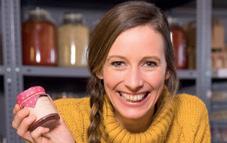
head a non-profit cooperative in Austria. She founded NETZWERT (NET WORTH), a network of women who have achieved leadership positions in a heavily male-dominated industry; more than 100 women now belong to NETZWERT.
Courage is rewarded
The main prize of 10,000 euros was finally presented to the young entrepreneur Hanna Gansch, because she is dedicated to energy, climate change and sustainability. Immediately after completing her studies, the technician founded a company for the "Fräsinator", an innovative and environmentally friendly drive system in a tiller that is used for snow in the Alps as well as for sand in the desert of Arabia.
More visibility for women's achievements
The Liese Prokop recognitions and awards make women's achievements more visible today. For although there are more and more women in leadership positions, and the salary gap is also slowly closing, there is still "a lot of room for improvement," according to Provincial Councillor Christiane Teschl, who presented the awards together with the sponsors on behalf of Provincial Governor Johanna Mikl-Leitner. https://liese-prokop-frauenpreis.at
Isabella Stickler is also a modern role model: As chairwoman of the board of a construction, housing and settlement cooperative, she is the first woman to
Christiana Pordes-Weidel, Wien
danube connects 01 I 23 18
Liese Prokop Women's Award Ceremony at Casino Baden near Vienna
Sustainability is the trump card for Lower Austria's women
70 Years of IDM, 70 Years of Research on the Danube Region
The Institute for the Danube Region and Central Europe (IDM) celebrates its 70th anniversary at the end of this year. Time to take a look at the think tank's work, which includes publishing the magazine Info Europa.

In 1953, thanks to the commitment of politician Theodor von Hornbostel, the IDM's predecessor, the "Research Institute for Danube Region Issues" was founded in Salzburg. For more than 30 years, it was the only scientific institution in Austria dedicated to Danube Region research - on this side and on the other side of the border of the Iron Curtain. In 1995, the now deceased former Vice Chancellor Erhard Busek - whose name might be familiar to some readers due to his involvement in the Danube Region - took over the management of the Institute and gave it its current name.
Since then, the IDM has been researching and working with a geographical focus on the countries of Central, Eastern and South-Eastern Europe, especially the Danube Region, which gives it its name. It promotes the public opinionforming process through its events, publications and educational activities. As Managing Director Sebastian Schäffer told danube connects, according to its statutes it aims to research the social, economic, political, legal, cultural, historical and ethnic problems of the Danube Region and the rest of Central Europe, to discuss them and to develop practical solutions to promote peaceful coexistence in the region. According to Schäffer, however, it is not only a matter of developing innovative concepts, but also of communicating them to a broad public through concise recommendations for action. For him, it is an indicator of the IDM's success whether these discussions flow into processes of political decision-making and whether
the expertise also remains relevant. "You won't find many institutions that deal with Central and Eastern Europe and can look back on seven decades of continuous work in and for the region," he emphasised.
Modern media orientation
That the IDM is not dusty despite its long existence is proven, for example, by the social media strategy of the inhouse magazine Info Europa. Editor-inChief Dr Daniela Apaydin, a research assistant at the IDM, regularly has short videos created together with the
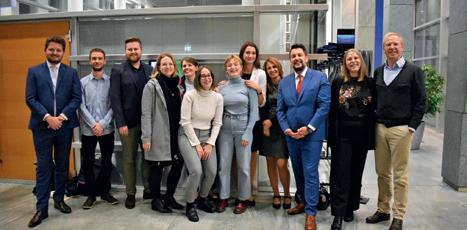
Vienna but at home in Euro- pe", is closely linked to IDM's vision that the people of Central and South-Eastern Europe are not only connected by the Danube and their common cultural heritage, but also face similar regional and global challenges, she added.
On 5 December 2023, the 70th anniversary of the IDM’s founding day, a final conference will make Vienna the meeting point of the best ideas and the starting point for new cooperations as well as projects with the Institute, Schäffer said. He doesn’t reveal any
IDM's social media expert. These videos introduce the magazine's topics and authors; furthermore, Apaydin and her team post articles that provide relevant background information, and they also want to use the IDM blog more for cross-media reporting. "Social media is not a competitor to print, but an important and exciting extension for storytelling that reaches beyond the confines of a simple page," Apaydin told us. Info Europa, which says it is "based in
more, but says that a lot is planned and the Institute is very much looking forward to meeting as many of its members, friends and cooperation partners as possible in person, exchanging ideas and celebrating together.
danube connects 01 I 23 19
Daniel Hirsch, Budapest
The young IDM team around managing director Sebastian Schäffer (3rd from right) continues the old tradition.
"New opportunities for Ukrainian IT enthusiasts".
The IAW International Academy's IT Support Programme Ukraine
In the IAW International Academy’s project "IT Support Programme Ukraine", Ukrainian trainees, students and graduates who have fled to Germany are supported in taking up employment with companies in Baden-Württemberg (BW), and people who return to Ukraine are supported with further training.
The support programme takes place in the Republic of Moldova, among other places, where many Ukrainian refugees found refuge in the course of Russia's war of aggression on Ukraine. The training - especially with Ukrainian young women, since they are not fighting in the war - also takes place online.
In this context, it is important for IAW to create permanent and high-quality jobs in Ukraine, because after completing their internship, the engineers will continue to work for German companies in the IAW competence centre in Ukraine. Another focus is on strengthening the transfer of knowledge to Eastern Europe. In order to contribute to a sustainable stabilisation of the economic and political situation, the promotion of start-ups and small and mediumsized enterprises is indispensable.
Several German companies are willing to award development, testing and prototyping contracts to Ukrainian trainees and engineers. The companies will award contracts to Ukraine on a longterm basis. This will ensure a long-term exchange of services and a sustainable impact, combined with job growth in Ukraine.
IAW is in contact with a large number of Baden-Württemberg companies in the fields of electronics, medical technology, automotive, measurement technologies, hospital software, etc. The refugees who have fled to Germany are thus given further training and prepared for employment with the BadenWürttemberg companies. One of the project’s great successes is that several trainees are already doing internships at well-known companies in BW.

"I now have the opportunity to work with specialists in the IT field, meet new people and gain the necessary experience to grow professionally. I am happy to be where I am now and to have the opportunity to participate in the development of IT web products that are widely known by a variety of companies in Germany," said one intern in the IT support programme.


I am happy to be where I am now and to have the opportunity to participate in the development of IT web products."
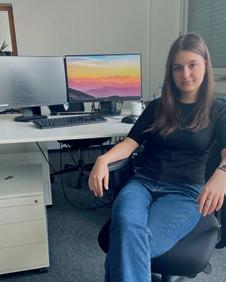
danube connects 01 I 23 20 Ukraine-aid
Sonderveröffentlichung der „
Emergency aid fund for consequences of the war of aggression against Ukraine

The Baden-Württemberg Foundation has been supporting non-profit projects in the Danube region for many years through the funding programme Perspective Danube: Education, Culture and Civil Society and, since the beginning of the war, also emergency aid projects in Ukraine. The focus is on network building and international understanding in the Danube region, thereby contributing to the implementation of the EU Strategy for the Danube Region (EUSDR). The main goal of the EUSDR is to further develop the region and to increase the prosperity and innovative capacity of the 14 countries in the Danube region, including Ukraine.
The countries in the Danube region, together with other neighbouring countries of Ukraine, have been severely affected by the consequences of the Russian invasion of Ukraine. In order to continue to react quickly and flexibly to the war situation and its consequences, the BadenWürttemberg Stiftung has been funding emergency aid projects in addition to a regular call for proposals for the Danube region since April 2022 as part of the Perspective Danube programme, in which non-profit organisations from Baden-Württemberg support people from Ukraine in Baden-Württemberg, in Ukraine or in neighbouring countries.
In 2022, the Baden-Württemberg Stiftung was already able to fund ten projects. The projects funded or sent in focus mainly on three core areas:
1. provision of emergency humanitarian aid in Ukraine and neighbouring countries
2. support measures and programmes for refugees in Baden-Württemberg
3. contributing to (re)construction in Ukraine.
The Baden-Württemberg Stiftung would particularly like to encourage organisations planning measures in the Republic of Moldova to submit applications, as the country's aid structures are severely challenged.
A new feature is the digital submission of applications via an application portal: antragsportal.bwstiftung.de. Non-profit organisations that want to help people affected by the war can apply to the Baden-Württemberg Foundation there on an ongoing basis. For applications in the regular call for proposals of the Perspective Danube, the relevant deadline for larger projects is 31 March or 31 October. Smaller applications in component A can also be submitted here on a continuous basis. Further information can be found on the Foundation's website at www.bwstiftung.de/de/ausschreibungen.
News from the Danube Youth Network (DYN)
On 10 May 2023, the Committee for Europe and International Affairs of the State Parliament of BadenWürttemberg invites the representatives of the funding project "Danube Youth EUSDR Participation" to present the results of three and a half years of setting up and developing the Danube Youth Network.
The Baden-Württemberg parliamentarians will be presented how the structural participation of young people within the EUSDR looks like and how a youth network could be implemented in the Danube region in a sustainable way. Iryna Gumenchuk and Stefan Barth, representing the associations Agapedia and Able e.V., as well as the Liebenau Foundation, will give presentations. Ratin Sazedul, the Baden-Württemberg representative of the Danube Youth Council (DYC), which will be constituted in December 2022, will also be present in the Landtag.
The Danube Youth Council comprises 28 young people from all 14 ESUDR countries. It is connected to the Danube Strategy Point (DSP) in Vienna. Its aim: to provide young people with access to the priority axes (PAs) of the EUSDR in order to make the concerns of the young generation heard and to be effective at the political level. It would be desirable to have the DYN and the DYC well synchronised. In this way, the EUSDR could be filled with life and sustainable participation of young people in theory and practice could be achieved. Info:
danube connects 01 I 23 21 EU Youth
www.danubeyouth.eu
EU YOUTH POPRI 2023
Innovation in Wonderland
It helps companies to effectively confront business and market challenges with the aim of developing their ideas into products and services and bringing them to the market as quickly as possible. Young people are the main focus: "They are our present and future, and they need us just as much as we need them. They experience development and change differently because they are open-minded and curious. This is precisely where cooperation with them is crucial and based on reciprocity. Their courage and innovation bring freshness to our activities. At Primorska Technology Park, we have recognized these values and provided them with a safe working environment in a setting where they can experiment and also make mistakes," explain Tanja Kožuh, Director of the institution, and Bojana Cipot, Head of International Cooperation and Project Management.
Innovative hub Sarajevo
An organic lipstick made from edible ingredients and a smoke that frees bees from the parasite varroa mite without harming them or the honey. Sounds promising, doesn't it? And these are not illusions! These and even more sustainable and environmentally friendly innovations already exist! Invented by young people still in high school or university. Ages 16 to 29. The examples mentioned above are now young successful entrepreneurs. Passionis lipsticks are selling well and Ecohive, the bee rescue company, has already found an important investor.
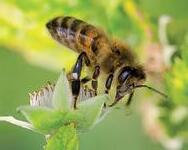
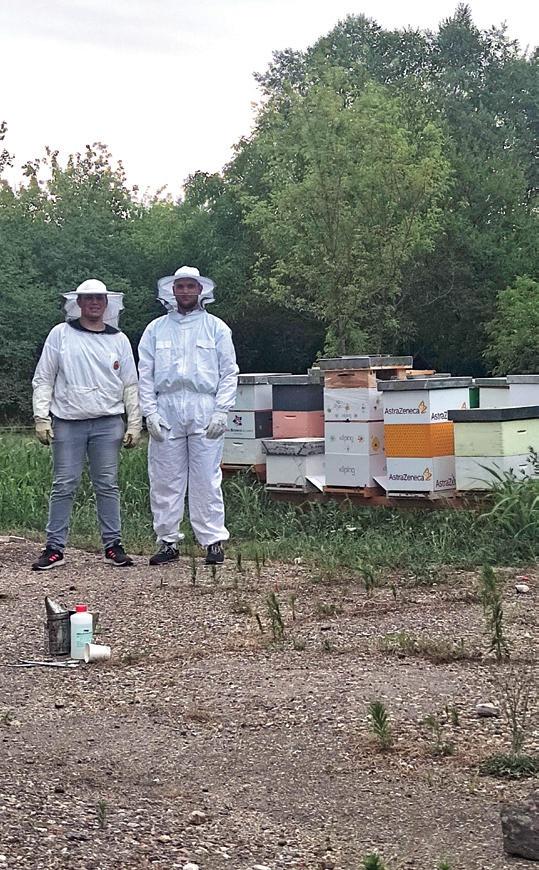
There are already 10 technology parks in the Adriatic-Ionian area of Europe that work closely together. "We have to plan and manage business incubators and technology parks with the future in mind, and it is necessary to create a clear vision in order to function in the long term for the next 10 to 20 years," says Tanja Kožuh.
A place to go for valuable ideas
But how did people become aware of these important inventions? Thanks to an institution in Slovenia that was founded in February 2020. The Primorska Technology Park in Nova Gorica, right
on the Italian border, is a technology park/business support institution that takes care of the creation, operation and growth of highly sophisticated companies with high market potential.
A joint meeting has been held once a year for two years now. That's when the national winners of all the technoparks in the high school and university categories compete and present their business ideas in front of an international panel. Last year the competition took place in Tirana, Albania, as part of the Adriatic-Ionian EU Forum. This year in Sarajevo, Bosnia and Herzegovina. Dragana Bajovic, Head of the Information Center in Banja Luka, is looking forward to the event: "We gladly accepted the invitation of our colleagues in Slove-
danube connects 01 I 23 22
Nikola Teomirovi´c, Miodrag Milanovi´c from Ecohive
nia to join the EUSAIR POPRI youth initiative three years ago. We participated in both competitions in both categories, high school and university. This competition is a unique opportunity for young people to learn about entrepreneurship, as well as to connect with young people from other countries and hear inspiring stories of successful entrepreneurs. We are particularly pleased that this year's competition will be held in Bosnia and Herzegovina and that we will have the opportunity to host promising young people.”
From diplomatic field service to technology park

About 50 young people and their counsellors are expected in the capital of Bosnia and Herzegovina. The heartshaped country is one of the youngest in Europe. The event, called EUSAIR PROPRI, will be gigantic this year. Of course, competing in front of an international jury is important. But more importantly, it's where peers from ten different countries will meet and exchange ideas. "We developed POPRI to deliberately focus only on young people. If we want change for the better, we have to give them a place and a voice and, above all, listen. By treating them with respect, we ensure that they too will behave respectfully and responsibly toward society and the environment," Cipot explains hopefully. The former diplomat joined Technoparks a few years ago. And she doesn't regret her decision one bit. On the contrary. She can put her knowledge and experience to wonderful use at Technoparks.
Especially with regard to international cooperation: "When I worked at the Ministry of Foreign Affairs, I involved young people in my activities and worked with them. Before I arrived, they were already very involved here and supporting young people in developing their business ideas. They were doing great work that I just 'put into the right packaging' and took to the international stage."


The commitment of all the technology parks is paying off. Young participants in the programme are the best and most prominent ambassadors, influencing the activities and behaviour of others through their own experiences. "Again and again we hear from parents that they are positively surprised, amazed and proud of their children, especially about their involvement and participation in the POPRI process, but also about their presentation and public appearance," Cipot is pleased to say. Bajovic, a leader from Banja Luka, sees the competition in Sarajevo as a great opportunity. "High school and university students from different countries can now share their knowledge and experiences with their peers. This is very important for young people."
Bosnia and Herzegovina will now become an international hub for innovation, developed by a generation that will form the future, from May 23 - 25. Judging by the great inventions shown last year, we can look to the future with hope.
Find more information about POPRI here: www.primorski-tp.si

danube connects 01 I 23 23
Mirella Sidro, Sarajevo
Dragana Bajovic, Business Incubator Manager, Banja Luka (BIH)
Technology parc in Nova Gorica
EU YOUTH
The author with Bojana Cipot, Head of International Cooperation and Project Management
Borderland
Photographs and editing of interviews: Frank Gaudlitz
From August to October 2021, I undertook the first of two planned journeys in the footsteps of Alexander von Humboldt from St. Petersburg to Tobolsk in Siberia. Russia's war in Ukraine has made it impossible for me to continue the journey. I cannot photograph Russia's towns and villages while the Russian military is bombing Ukraine. Even though now the warlord Vladimir Putin is closing off this realm again and making it impossible to continue
Snezhana S., 28 years with their children from
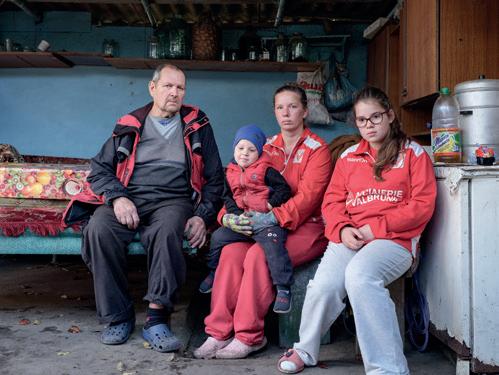
Ekaterina N., 36 years with their children Yuliana, 9, and Miroslav, 2 years, from Odessa in the house of her father-in-law
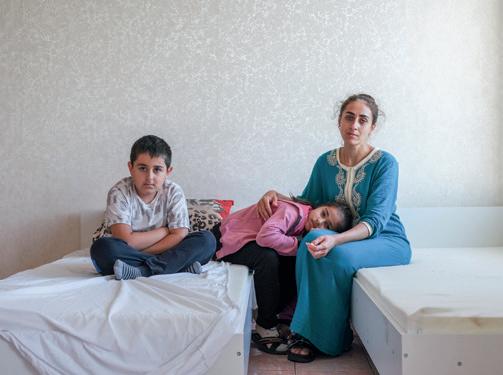
danube connects 01 I 23 24
Kharkov
Nina P.
„I had plans, I had my ideas, I wanted to evolve. But now I live in limbo. I don't know what I can do now. People don't have dreams any more. The ideas and dreams are lost. We only live in today.
I am 39 years old and I feel like my life is already over."
Chisnau
Republik Moldau
Ukraine Rumänien
following Humboldt's Eurasian voyage, this constraint points in a new direction: continuing the project on a route determined by reality, through the states affected by the consequences of war.
In October 2022, a first journey took me to the Republic of Moldova, a country in which more than a quarter of the population lives below the poverty line, but to which almost half a million Ukrainians have fled.

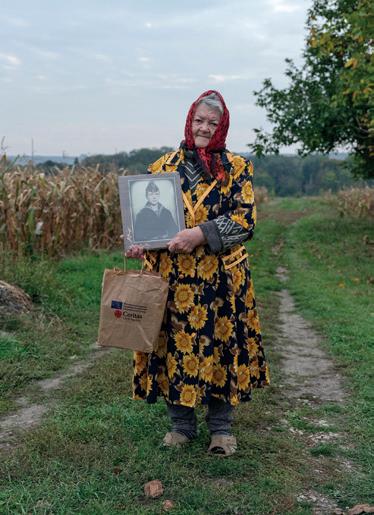
Natalja M., 34 years with their children Anastasia, 10, Angelina, 9, Diana, 3 years from Vinnica
“
Near our flat there was a small square where there was a flower market. That's where the rockets fell. It was the middle of the day. There were dead people and flowers everywhere. We knew one of the vendors. We always wished her a good day."
For reasons of security, the text fragments of the interviews stand on their own, there is no assignment to the portraits.
More info on the blog: www.grenzland-zwischen-krieg-und-frieden.de
danube connects 01 I 23 25
Tamara C., 79 years, from Sokirjany, Chernivtsi region
Adriana P.




























 Mirella Sidro, Sarajevo
Mirella Sidro, Sarajevo


































